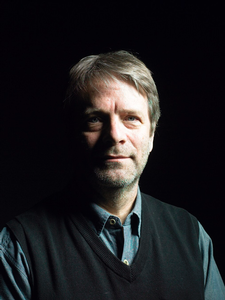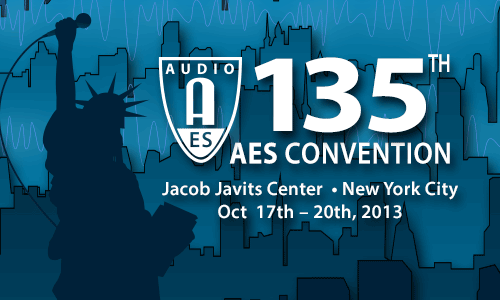
AES New York 2013
Thursday, October 17, 7:15 pm — 8:30 pm (Room 1E15/16)
Heyser Lecture: George Massenburg
Presenter:George Massenburg, Schulich School of Music, McGill University - Montreal, Quebec, Canada
Abstract:
The Richard C. Heyser distinguished lecturer for the 135th AES Convention is George Massenburg. Massenburg has participated (individually and collaboratively) in over four hundred records over the past 45 years. His studio work has gained him international recognition and four Grammys as well as numerous Mix Magazine TEC Awards. In 1988 he also won the Academy of Country Music Record of the Year Award. George has designed, built, and managed several recording studios and has contributed to the acoustical and architectural design of many other studios, including George Lucas’ Skywalker Sound. In 1982, he founded George Massenburg Labs, a pioneering audio electronics company that has released an extensive range of innovative recording technologies, all based on his original designs. In 1999, he and a partner founded Massenburg Design Works, making high-resolution digital processors and plugins. George was awarded an honorary Doctorate of Music by Boston’s Berklee College of Music. Regularly published in professional journals and trade magazines worldwide, George Massenburg received the Gold Medal from the Audio Engineering Society in 2008. He is a member of the National Recording Preservation Board of the Library of Congress and an advisor to the Committee for Library Information Resources. George serves as the Chief Technical Officer of META (the Music Engineering Technical Alliance). Currently, he is an Associate Professor of Sound Recording at the Schulich School of Music at McGill University in Montreal, Quebec, Canada; a Visiting Lecturer at the Berklee College Of Music in Boston and Valencia, Spain; and the University of Memphis in Memphis, TN. He and his wife, Cookie Rankin, and dog, Charlie, live in Montreal, Quebec.
There are so many advances in technology and science these days, we are quickly overwhelmed with data. From batteries to the brain, new possibilities abound. It’s difficult to know what information is meaningful and how to digest it, not to mention how to apply it in our own best interests. Often it seems we are immersed in irrelevant noise, hesitant to accommodate change.
It used to be extremely expensive to record anything of technical quality. Analog tape machines, ¼”, then ½” then 1” and 2” reels of tape, large-frame analog consoles, microphones, peripheral processing, reverb, relatively good studio acoustics were not affordable to most artists. Also, the expertise (producers, engineers, mixers, mastering engineers) needed to get the best sounds possible out of the air onto the tape—these all cost a lot of money. The technical complexity of recorded music production is magnitudes cheaper now. But for the cognitively complex tasks that traditional producers, arrangers, A&R men and women, and engineers brought to clarify and to enhance artistry in composition and performance the picture is different. It still takes a lot of practice to be good at complex tasks. As Malcolm Gladwell points out, “Talent is important, but achievement is talent plus preparation.” In cognitively demanding fields, there are no naturals, and the making of a quality recording is a process demanding cognitive skills to process musical ideas and then comparing them objectively to retained experience. These areas of cognition/thinking move from and between levels of complexity simultaneously, and seemingly without reason or even awareness–these are tasks for the “right brain.” Unfortunately, along with the disruption of the traditional music industry came the conclusion that there’s little importance in these cognitive skills, and the “10,000 hours” that might be required to refine them is time wasted.
Every week the antiquated record industry trumpets its sales figures and the even more ancient media industry repeats them. But despite the best attempts to discredit the new emerging industry, the supposedly “impossible” is happening all around us as many “unsigned” artists top the sales charts of the digital music stores and sell millions of units of music.
Never before in history has there been an opportunity as we now have before us. And, as Steve Jobs demonstrated, people will pay if you give them a high-quality offering. “Good enough” is no longer good enough. The job is to transform ourselves. Making music requires nimbleness, out-of-the-box thinking, resourcefulness, risk-taking, courage, and skill. And always taking a new approach. Take Neil Young. Now, despite criticism from some in the professional audio sector, he’s proposing a music download-service, player, and audio format, whose aims are "to confront the compressed audio inferiority that MP3s offer," "to present songs as they first sound during studio recording sessions," Dylan says it’s clear why Neil Young has not tumbled into musical dotage: “An artist like Neil always has the upper hand,” he says. “It’s the pop world that has to make adjustments. All the conventions of the pop world are only temporary and carry no weight. It’s basically two different things that have nothing to do with each other.”
There’s no going back. There’s no road map for those hoping to understand possible future roles in music as a profession–it’s still evolving. But there is hope. Music is a part of all cultures around the world. It takes on different forms and is constantly changing–developing in new directions. These fundamental facts are the best proof of the importance of music to mankind. Never before in history has there been an opportunity as we now have before us.

